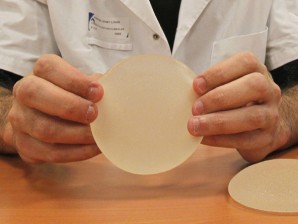BUENOS AIRES, Argentina — A group of 50 Argentine women threatened to sue their plastic surgeons on Tuesday if they don’t get free replacements of faulty French breast implants.

Dr. Maurice Mimoun, a plastic surgeon at the St Louis hospital, holds a silicone gel breast implant made by French company Poly Implant Prothese, or PIP, that he removed from a patient because of concerns that they are unsafe, Paris, Wednesday, Dec. 21, 2011. French health authorities are considering whether to suggest that an estimated 30,000 women in France get their breast implants removed, amid warnings by leading doctors about risks of rupture and possible cancer risks. MICHEL EULER/AP PHOTO
The group is led by attorney Virginia Luna, who herself has the “PIP” silicone gel packs implanted in her breasts. She said five of her clients have obtained out-of-court agreements to provide free replacements, and if the rest don’t get them as well, her group will sue.
The implants made by the now-defunct French company Poly Implant Prothese were banned last year in countries around the world after more than 1,000 women suffered ruptures. In all, 30,000 French women got the implants, and could experience harmful leaks of cheap industrial-grade silicone — not the medical-grade gel that higher-quality implants use.
France’s health system has recommended that any women with the implants get them replaced, and has agreed to pay for surgeries that could total millions of dollars. Not so in Brazil and Argentina, where thousands more of the implants were sold. Health officials in both countries just recommend checkups.
Argentine clinics say they’ll replace leaky implants, but the symptoms aren’t always detectable, and Luna says any woman with the faulty implants can suffer psychological damage.
The replacement surgeries can cost up to $3,500 in Argentina, Luna said.
“In my case, they’re OK. I check periodically, but I am afraid,” she said, recalling that when she had them implanted in 2007, she was told they were the best in the world, and would last her entire life.
How many Argentine women received the PIP implants is unknown, although about 13,500 of them were imported from 2007 to April 2010, when they were banned.
Some plastic surgery clinics have said they would cover the cost of removing them, but not replacing them, Luna complained.
Luna said she wouldn’t rule out suing the government if it doesn’t take action to protect these consumers.
Some legislators also say the Argentine government should cover the costs.
“It would be a good move if the State opens a clinic in one of the city’s public hospitals to attend to women with these implants, analyze each case and later extract them at no cost,” Deputy Daniel Amoroso said in a statement. He said about 28,000 women get breast implants each year in Argentina.
In both Argentina and Brazil, government officials also asked doctors to notify federal agencies of any patient complaints.
It would be premature to have women remove the implants if they’re not having any problems, said the president of Brazil’s Plastic Surgeons Association, Jose Horacio Aboudib.
“I’d remove them from any patient that wants to, but I don’t see the need for everyone to go into surgery,” he said.
Aboudib added that the Brazil surgeons’ association in January will create a national registry of breast implants, where doctors would enter information about the patient, the date of the operation, and the product used, to improve safety and follow-up care.
Associated Press Writer Juliana Barbassa in Rio de Janeiro contributed to this report.